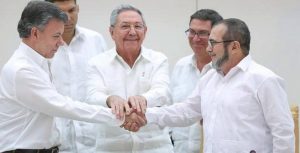
By Susan Gately - 28 August, 2016

President Santos (left) and FARC leader “Timochenko” shake hands after meeting facilitated by Raul Castro (centre)
Following 50 years of civil war, last week the government of Colombia and the Revolutionary Armed Forces of Colombia, or FARC, announced a “bilateral” and “definitive” ceasefire, and agreement on a 6-point plan towards peace and reconciliation.
The plan includes the economic and social development of rural areas and provision of land to poor farmers, the participation of rebels in the political system and deals with the illegal drugs trade, transitional justice, ceasefire and disarmament.
Under the accords, FARC militants promise to disarm over the six months after the final accord is signed and join the political system once the peace accord is ratified by a referendum of the people which is to take place in October. Polls suggest the referendum will be carried two to one.
“The peace agreement calls for sweeping structural reforms and social investments that have the potential to transform the country into a more prosperous and equitable society.”
“They include comprehensive agrarian reform, which would narrow the gap between Colombia’s booming urban centres and the historically impoverished and neglected countryside,” says an editorial in the New York Times.
FARC has vowed to halt its involvement in the drug trade, which has been an accelerant of the conflict in recent decades.
“Restoring government control over regions where cocaine is grown and trafficked would make it easier to confront the scourge in an effective manner,” it adds.
“Today I can say, from the depth of my heart, that I have fulfilled the mandate which you gave me,” a jubilant President Juan Manuel Santos declared on Wednesday.
President Santos was re-elected in 2014 on the promise of peace accords.
“Columbians, the decision is in your hands. Never before now have the citizens of our country had the key to the future in their hands,” he said on a television broadcast.
“We’re not going to fail! This is the chance for peace! On 23 March 2016 we will be bidding farewell to the longest-running conflict in the Americas,” said President Santos following a meeting in Cuba with FARC leader, Timochenko, facilitated by Raul Castro.
“Let’s join efforts to achieve peace,” Farc leader Timochenko later posted on the rebels’ Twitter feed.
Under the accords, FARC will be represented in Parliament without voting rights until 2018 and then will be allowed to take part in elections. At that point the 7,000 former rebels will have to win their seats alongside members of other political parties.
The peace accords end a war which has lasted 52 years and cost 220,000 lives. Negotiations have been going on over four years.
Under the accords, FARC members must surrender their arms to United Nations personnel and disclose the nature of their involvement in the conflict to a special tribunal that will include Colombian and international jurists.
Those who admit to grave crimes — like kidnappings and executions — would be subject to periods of restricted mobility for five to eight years, during which they would be expected to perform community service.
Those who have committed less serious crimes — like drug trafficking — would receive amnesty.
“This arrangement is not ideal, as it inevitably would leave many crimes unpunished,” comments the New York Times.
“But if it is managed carefully, it could allow many victims to have their day in court while holding war criminals — including members of the military — accountable to some extent for the worst atrocities of the war.”
According to the Economist, the credibility of the agreement will turn on the “integrity of the special tribunal and effective verification of disarmament”.
But it notes that the peace agreement comes at a time when Colombia is facing a sharp economic adjustment.
“The IMF expects the economy to grow by only 2.5% this year, compared with 4.4% in 2014. To fill a hole in government revenues caused by the oil slump, Mr Santos is preparing to raise taxes later this year. His opponents bridle at the notion of paying taxes to help the FARC.”